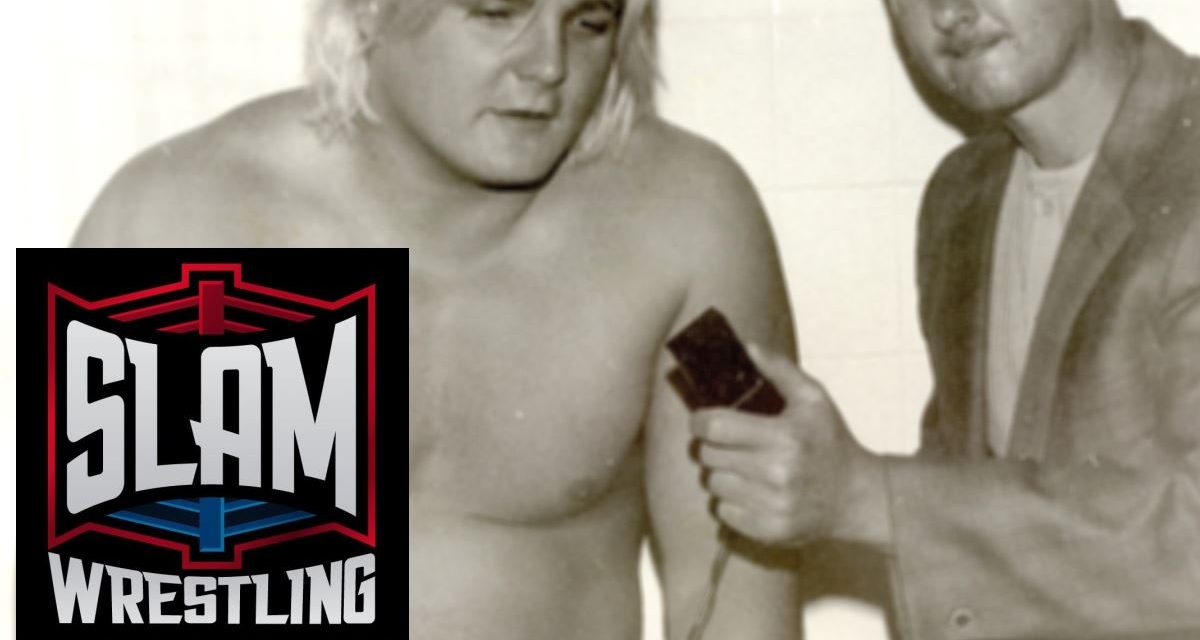Ed “Moondog” Moretti, who wore several hats in the wrestling business, was a well-travelled wrestler and a key player in the Pacific Northwest for over a quarter century beginning in 1978. His career goes from his youth in Northern California to national expansion, and then an attempt to reboot a territory.
SLAM! Wrestling: Ed, you did a lot over the course of your career in the Pacific Northwest. What was it that first got you interested in wrestling?
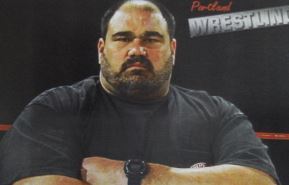
Ed “Moondog” Moretti
ED MORETTI: I was born in San Francisco, but we lived most of the time before I went on the road for wrestling in Daly City.
SLAM! Wrestling: Daly City — home of the Cow Palace.
MORETTI: That’s right. Roy Shire had just started his TV show on a very powerful station called KTVU — Channel 2 in San Francisco and Oakland. My brother was a sports nut, and every so often he would watch wrestling. That’s the one I was most interested in …. Every time wrestling was on I was just transfixed, and I had to see it. I guess I started about when I was three years old watching wrestling.
SLAM! Wrestling: That was in the early 1960s — right about the time Shire put the competition out of business in Northern California.
MORETTI: He ran Joe Malcewicz out. He said, “I’ll be glad to work with you,” and Malcewicz turned him down. Shire said, “Okay, I’m going to take everything.” Malcewicz didn’t run the Cow Palace, and Shire wanted to run the Cow Palace. That was his baby.
SLAM! Wrestling: Did you watch wrestling from other promotions in the 1960s?
MORETTI: Everything I could find. When they’d occasionally have tapes come in from somewhere else, I would watch it. We had a station in Chico, Calif., that ran some wrestling from Argentina … and they also had old Chicago wrestling from the Chicago Amphitheatre. But to get that, I’d have to go on my roof and hook up clothes hangers onto the antenna … and I’d have to turn that around a certain way to get it to come in.
I discovered wrestling magazines in probably 1967. From there I bought all the back issues that they had because I was crazy about it. And then also I’d exchange results with guys from other areas. … I started exchanging programs, results — all that stuff. Once I found those magazines, I was gone. That consumed me.
SLAM! Wrestling: Which wrestlers really made an impact on you at that time?
MORETTI: My two idols were Ray Stevens and Pat Patterson. … They were the guys that I wanted to emulate. I wanted to work like them. I think they were the two that made the biggest impressions on me. Another guy that made a big impression on me when he came out here in 1967 was Bruno Sammartino. … He wasn’t really that technical, but he looked like a wrestler. … I think he made a big impression. That’s why he was so over.
SLAM! Wrestling: How did you make the transition from fan to wrestler-in-training?
MORETTI: In about 1974 or 1975 a friend of mine in a town called Colma, which is right next to Daly City, had a big backyard, so we built a ring in his backyard and started training in that thing. We didn’t know what we were doing, but we were training anyway. It was full-sized [but] there was no spring to it. It was like a boxing ring.
[We] made the most of it; just kept trying things over and over and over again, and finally we started running little shows in that ring in the backyard, inviting people in the neighborhood to come over and watch.
SLAM! Wrestling: How did the shows go?
MORETTI: They did good. They did really good. There were guys from the East Bay doing the same thing we were doing, and we didn’t know about it. We met them at the Cow Palace and started talking to them, and one of them happened to be Roland Alexander, who ended up starting APW [All Pro Wrestling]. We’d all get together and start having shows in that backyard.
SLAM! Wrestling: Are there any names from your group that fans may recognize?
MORETTI: Steve Pardee — we trained him. A guy that also started with us was named Sonny Meyers — the new Sonny Meyers that worked in Canada. He also worked as Bob Patterson and Bob Adonis.
SLAM! Wrestling: How did the pros at the arena seem to react to what your group was doing?
MORETTI: Some guys wouldn’t talk to you because [of] kayfabe at the time and everything. But some of them heard about us from other guys that talked to other wrestlers, and so we were getting a little bit well known. The joke was, everybody used to say, “I heard a rumour that Roy Shire was going to send somebody down to stretch all you guys at one of your shows.” We didn’t charge admission. We just had people come and watch so we could work in front of audiences. We didn’t know what it was called, but we knew about kayfabe, so we were really strict about that. We didn’t let those people who’d come to the show — they didn’t see us together …. We were very secretive of the whole thing trying to keep up appearances that we knew the pros did.
SLAM! Wrestling: How did you become a professional?
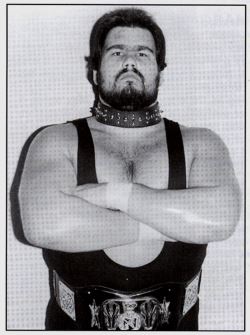
A young Moondog Moretti.
MORETTI: Myself and Steve Pardee ran into Buddy Rose when he first started down here in San Francisco. Of course, both of us, being fans, had heard of him and saw videotapes of him that other people took. So we just started talking to him, and he took pity on us because he said, “You know, you guys, I was the same way you were. It’s hard to get in the business, but I was the same as you guys. I wrestled with my friends. We were serious. We weren’t just screwing around. We trained every day, and I finally got in the business. You guys can do it too if you just be serious, keep working out, and just get better. Shut your mouth and open your ears.” And that’s just what we did. And finally Buddy introduced me to [San Francisco/Big Time Wrestling booker at the time] Red Bastien. … Red saw me and knew I was serious, and me and Steve went on some road trips with Dean Ho. … We got along great …. We paid him trans just to ride with him to shows, and he loved that, of course. He told Red Bastien about us too, so one day Red [said to me], “Ed, you’re old enough to get in this business if you really mean it. I want you to lose 100 pounds” — I was a pretty big kid then. “If you can lose 100 pounds I’ll start you.” About four months later I came back to him, and he said, “Holy cow, how much weight have you lost?” I said, “I’m down about 75 or 80 pounds.” “And you’re still working out?” “Yes, Red, I’m still working out.” … And he said, “All right, I’m going to talk to Roy and see what he says.”
So Roy Shire gave him the okay to tell me to get my referee’s licence. So I got a referee licence in April of ’78 and they started me refereeing in the smallest town they had, which was Modesto. I was going to the towns anyway, so sometimes the referees wouldn’t show up … so they had me refereeing even more than I was scheduled to. Originally it was just Modesto, and I guess Roy liked the way I refereed. The next thing I know Roy calls me on the phone one day in July and says, “I want you to go get your wrestling licence.” So I went and got my wrestling licence and started in Modesto about a week later. I was filling in on different shows, and the rest is history.
SLAM! Wrestling: It wasn’t long until you moved up the coast.
MORETTI: In October I got a call from Red, and he said, “You’re wrestling in your local area, and they’ll never give you a push in your local area yet because you don’t have any experience. I want you to go out and get some experience and come back here.” Unfortunately, by the time I got back there it was pretty much over with.
SLAM! Wrestling: So you headed up to British Columbia?
MORETTI: Red and Dean Ho put the word in for me to [Gene] Kiniski and [Al] Tomko. … On my way up to Vancouver I stopped for a week and did all the shows up the road. I did Medford, Ore., Newport, Ore., I did the Portland Sports Arena, [and] I did the Seattle arena show. Buddy Rose got me booked on those on my way up. … I guess Buddy called Don Owen and said, “I’ve got a guy going up to Vancouver. Can you use him in some shows on the way so he can get some money to get up there?” I guess Don said, “Sure. Send him up.”
SLAM! Wrestling: What was your first impression of Portland Wrestling?
MORETTI: It was great. I absolutely loved it. … Portland kind of reminded me of a smaller version of San Francisco. It had that kind of feel to it. I think I wrestled a guy named Siva Afi. Another guy I wrestled in one of the little towns up there was Tom Pritchard.
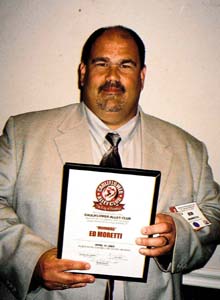
Moretti with his Cauliflower Alley Club award in 2003. Photo by Rose Diamond
SLAM! Wrestling: And what did you think of All-Star Wrestling when you got to Vancouver?
MORETTI: I was kind of taken aback because they didn’t run the hot angles that they did in Portland and San Francisco. It was a much more muted kind of territory.
SLAM! Wrestling: Fans in the Northwest remember you mainly as Moondog Moretti. How was it you became a Moondog?
MORETTI: When Lonnie [Mayne] died, I just said, “Well, I like his style of wrestling, and I think it would be good in other areas to expose that gimmick.” But I didn’t want to copy him. I didn’t bleach my hair … but I did get a dog collar. That’s something that he didn’t wear. It’s a tradition and a respect, and I never called myself Mayne. I always went by Moondog Moretti.
SLAM! Wrestling: A lot of people would say Vancouver wrestling was past its peak when you got there in 1978. Do you wish you’d had the chance to get there a few years earlier?
MORETTI: Yeah, sometimes I used to think that, but the promotion I really wished I could have gone to but missed, just by a year, was Super Star Wrestling with Dean Silverstone [in Washington State].
SLAM! Wrestling: I know you met your wife Dale not long after arriving in British Columbia.
MORETTI: I met her pretty quick in. It was like a couple of months, maybe … a month and a half or two months. … She loved wrestling so much, just like I did, which really drew me to her. … I could talk to her about wrestling, and she knew all that stuff. … We were very attracted that way to each other. She wanted to go on the road. She had no problem with that, so when I would leave she would come on the road with me …. She didn’t do it so much in Vancouver. She went to a few of the shows on the mainland, but on [Vancouver] Island she was always there. She was friends of Roy McClarty and his family.
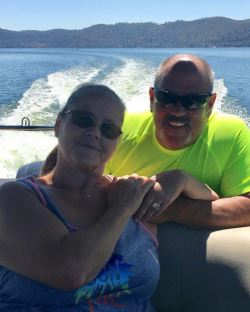
Ed and Dale.
Roy helped me a whole lot in Vancouver. He was like a mentor to me, [helping with] what went on in the ring, how to act, how to stand, how to talk, everything, what to watch out for — everything. He just was a great, great friend and a great, great mentor.
SLAM! Wrestling: You had a long, successful stay in B.C. What were some of the highlights?
MORETTI: I got to be the Canadian Heavyweight champion a couple of times and Canadian Tag Team champion a couple of times. They had, for a while, the Vancouver Island Heavyweight championship. I was that, I think, twice.
I got to travel with the Canadian Heavyweight championship belt twice — once to Singapore and Malaysia and once to New Zealand and Singapore. I asked Tomko if I could take the belts with me because I was going overseas to work some tours, and he said, “Sure. Go ahead.” On one of the tours Gerry Morrow went at the same time as I did, and he was in Vancouver at the same time I was. … We worked some angles and dropped the belt back and forth.
SLAM! Wrestling: You worked in several territories in the 1980s when the wrestling business was changing. What were your feelings at the time?
MORETTI: I was a little nervous about what was coming. I knew that it was changing. The territories were dropping like flies, and that was a bad sign. There was only so much room in certain organizations that were still going.
In ’86 I went to Kansas City, and then they closed down. I knew that Vancouver was going to go [down]. They were trying to imitate [the WWF]. It was just a bad imitation. You can’t do that. [Tomko] was just trying to hold on with his fingernails, you know. Portland stayed around longer because the fans were educated differently. They didn’t really like the WWF. They liked their Portland guys. They called them the real wrestlers. … But then they started seeing their guys from Portland go to the WWF, which was good at the start because they’d say, “Wow, they’re big stars,” but then they’d say they joined the circus.
In ’87 my wife and I were offered a job to run a motel in Canby, Ore. That was good for me because we were living right in the middle, which is near Portland, and I could do wrestling shows at night and sometimes make shows into B.C. So that’s what I did. I just home based out of that and travelled around Oregon as much as I could and Washington and once in a while B.C. shows, and sometimes I got to hit independent shows out of California too.
SLAM! Wrestling: A lot of people may not be aware that you served on the Oregon Boxing and Wrestling Commission in the 1990s.
MORETTI: I’d been [in Oregon] too long and Don Owen was going through booking problems. He had different bookers, just very briefly, and he got Len Denton in there. Len Denton and I got along for the most part, but we didn’t see eye to eye a lot of times at the end there. So what happened was I was not working much. There wasn’t much going on in Oregon and in Washington, and Vancouver, nothing hardly, and California. And I got invited to join the state athletic commission in Oregon.
The head of the commission at the time was a gentleman named Bruce Anderson. Bruce was a hard-nosed guy … and he was a boxing aficionado, but not so much wrestling. And he was a smart enough guy to realize when he was being swerved by the wrestling promoters. … Bruce and I became friends, and one time he asked me, “How would you like to be on the commission? We don’t have any wrestlers on the commission.” I said, “Yeah, I noticed that, and I think there should be a wrestler on the commission.” He said, “Me too.” So I joined the commission to help wrestling.
SLAM! Wrestling: Did any fellow wrestlers have a problem with that?
MORETTI: They thought maybe I was there to stooge them off, and that’s not the case. I’d say some held a grudge, or just a suspicion. … I just figured, I was straight with them, and I’d tell them, “I’m trying to help, not hurt you guys. I’m one of you guys, and I don’t want to hurt anybody.” Sometimes you can’t make them see it.
SLAM! Wrestling: What were you able to accomplish on the commission?
MORETTI: We got a lot of the stuff cleaned up. A lot of the rings were really filthy and dangerous, and we got a lot of that stuff cleaned up. We got guys medical coverage. If they ever had a squabble about not getting paid, or they didn’t get paid right, they could go to the commission and talk to them about that and they’d have a hearing, and that sort of thing. I just think it was good to have a wrestler’s point of view because most of the guys who were on the commission at the time I was there were ex-boxers or boxing promoters.
SLAM! Wrestling: You were on the commission, I think, about two years. Why did you leave?
MORETTI: I wanted to start wrestling again. They were starting to do more things up in Washington and B.C., and I just thought, “You know, it’s time. I did the best I could do.” Bruce Anderson got off the commission and it went to some other people, and I didn’t like the direction I was feeling it was going in.
SLAM! Wrestling: Over a decade after Don Owen’s promotion folded, you were back in the picture as one of the forces behind the new Portland Wrestling from 2003-05, along with Frank Culbertson and Mike Rodgers.
MORETTI: Well, we had talked about it a long time. I must have met Frank in ’84, ’85, or ’86, and I met Mike a long time ago too. We’d always talk about “Wouldn’t it be great to have a promotion bring back Portland Wrestling?” We’d always just kind of talk about it and casually throw it around and talk about what we’d do. … It sounded so believable and so credible and so possible.
SLAM! Wrestling: I understand things were going very well until Culbertson brought in a couple of guys you didn’t especially want to work with behind the scenes. Did that spell the end as far as you were concerned?
MORETTI: It was a good experience until it started to fall apart. It was good till it wasn’t. I guess that’s the way to express that.
SLAM! Wrestling: A couple of years ago you were one of a great class of ex-wrestlers to be named to the All-Star Wrestling Hall of Fame.
MORETTI: That was fantastic. That was a really nice treat that the All-Star Wrestling crew did for me. And Kevin Jefferies, of course — he had a lot to do with that too. And that was nice because I wanted to get back to Cloverdale and say hi to the fans and see how it was. It felt good being back. It was really nice. I saw a lot of people there I hadn’t seen in a long, long time.
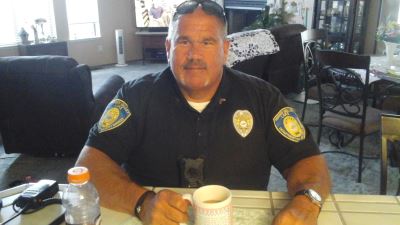
Life after wrestling … Ed Moretti getting ready to keep the order as a patrol officer in a gated community in Northern California.
SLAM! Wrestling: You’ve done a lot in the wrestling business — refereeing, managing at times, wrestling around Asia and the Pacific, working for the WWF, working for territories we haven’t talked about here, and, of course, contributing a lot to the wrestling industry in the Pacific Northwest over more than a quarter century. What really stands out when you look back?
MORETTI: I got to meet both my idols … Ray Stevens and Pat Patterson. Pat, I still see occasionally at the Cauliflower Alley Club stuff, and I got to work with Ray twice. One time on an AWA show in Oakland I actually got to work with him, and one time in the Cow Palace I refereed an 18-man battle royal, and then, after the battle royal was over, they told me, “How would you like to referee an NWA title match?” I said I’d love to, so he had an NWA title match with Harley Race, and I got to referee that. It was pretty cool. … I worked with Ric Flair in Singapore for the World heavyweight championship. … I wrestled Steamboat for WWF TV. … He was fantastic. I thought a lot of Ricky Steamboat [and] Ron Starr. … I enjoyed working with Terry Adonis, who was my tag team partner a lot [in British Columbia]. Dean Ho had very good ring psychology. He helped me out a lot. I was impressed by him. … The Dynamite Kid was unbelievably talented. Owen Hart, unbelievably talented. I liked Bret Hart. I worked with him a couple of times. He was a great wrestler. I loved working with Gerry Morrow.
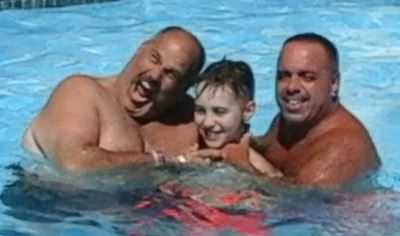
All in the family … Ed Moretti, son-in-law the late Buddy Wayne, and Ed’s grandson Nick Wayne, 12 years old and already a capable wrestler
SLAM! Wrestling: I’ve enjoyed looking back with you. What lies ahead?
MORETTI: I’m really proud of my grandson. He’s doing really, really good. That’s Buddy Wayne’s kid. He’s actually had his first pro match at 12 years old. They actually paid him for his match and everything up in B.C. He’s wrestled nine shows or something like that, and he really, really is doing great. … He started training since the time he could walk. … That kid can do everything. He’s unbelievable. His name is Nick Wayne. … The tradition continues, and he’s going to be great.
SLAM! Wrestling: Last question, Ed. I’m not sure how much you watch of wrestling in its current form, but what do you think of what you see nowadays?
MORETTI: I’m heartbroken by it because I miss the mystique. I miss what the fans used to come for — the soap opera, the mystique. When I was a kid I would live and die with Ray Stevens and Pat Patterson. I was just, like, at the edge of my seat. I don’t see that anymore. I see guys doing moves that are astronomical, beautiful. I mean, it’s unbelievable talent. But I don’t feel that mystique anymore. There’s nothing to bring you back. There’s no angles, really, to bring you back. … That’s what you [used to have] in wrestling. Not everyone believed in wrestling, but the ones that did, you had ’em going, “What is going to happen? What’s going to happen next? I’ve got to watch, and I’ve got to go.” And they’d use those TV shows to dangle a carrot and say, “If you guys really want to see the end of this, you have to come out to the arena.” And I miss that. That’s the stuff I miss.
RELATED LINK
